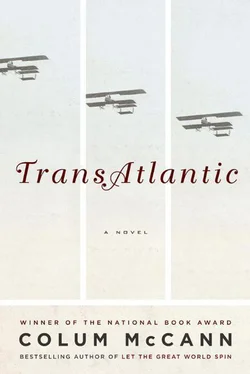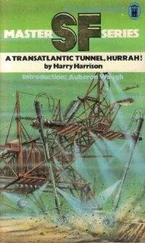TOMAS IS SHOT dead seven weeks into the hunting season. In the early morning dark. In his small blue rowboat. In his new ritual of scattering the decoys out on the water.
She is asleep when she hears the first shot. Ambrose beside her. The rise and fall of his chest. His irregular breath in the back room of the cottage. He shifts slightly in the sheets and turns towards her. His pajama top open. A small triangle of flesh at his neck. The heavy odor of his breath. Lottie shifts slightly away from him. An air of dust about the room. Sure, at first, that she is mistaken. Not a familiar sound for the dark. A crack of falling brick from inside the chimney perhaps: it has happened before. Or the shatter of an outside slate. She fumbles at her nightstand to check her watch. Brings it close to her eye. Has to turn it in her hand, over and over. Five twenty in the morning. That was not a gunshot. Too early for that. Something falling perhaps in the barn outside, or some disturbance from the living room. She glances towards the window. The rain hard against it. The bare cold of the frame when she touches it.
There is, then, a second shot. She puts her hand to Ambrose’s shoulder, allows it there a moment. Maybe she has overslept. The curtains are tight after all. Some trick of the light. She rises from the bed in her nightdress. Finds her slippers on the cold floor. Steps to the window. Parts the curtains. All dark outside. Surely then she is just imagining. She peers out towards the lake. Nothing at all. Only the darker shape of a windbent tree. No moon or starlight. No boat. No small red light. No sign of anyone. Silence.
She closes the curtains and steps back across the room. Allows the slippers to fall from her feet. Lifts the edge of the blanket and the sheet and is halfway into the bed when she hears the sound of the third shot.
That, she thinks, was no slate. That was no tumble of brick.
2011, the garden of remembrance
I’VE HAD IN MY POSSESSION, FOR MANY YEARS NOW, AN UNOPENED letter. It traveled by Vickers Vimy over the Atlantic almost a hundred years ago, the thinnest of letters, no more than two pages, possibly only one. The envelope is six inches wide, four and a half high. It was once light blue, though it is now discolored with patches of smoke and yellow and brown. The writing on the front has faded and is just about legible. No postmark. It is crumpled at the edges and it has been folded over a number of times. For many years it was thrust in and out of pockets and cupboard drawers. At some stage it was ironed out and there is a burn in the upper right-hand corner, a small corruption of black, near the indicia, and there are tiny water splats across the envelope as if, perhaps, it was once carried out into the rain. There is no seal, no insignias, no discernible shape to what may lay inside.
The letter has been passed from daughter to daughter, and through a succession of lives. I am almost half the letter’s age, and have no daughter to whom I can pass it along, and there are times I admit that I have sat at the kitchen table, looking out over the lough, and have rubbed the edges of the envelope and held it in the palm of my hand to try to divine what the contents might be, but, just as we are knotted by wars, so mystery holds us together.
I am shamed to admit that I have spent much of my time with no particular purpose, unfaithful to my inner promises — a couple of years nursing, a decade in the Women’s Coalition, some farming on the island, a few months selling cosmetics, a couple of years breeding bird dogs. I had a child at nineteen, lost him when I was thirty-eight. The bare truth is that I want nothing so much as to hold my dead son in my arms again — if I knew that I could see Tomas row a boat up to the shore, or walk through the kitchen in his wading boots, or step along the mudflats with his binoculars around his neck, I would tear every last piece of the letter to pieces, scatter the lives across Strangford and beyond. As it is, I cherish it. It is kept in the pantry of all places. On a middle shelf, on its own. Tucked inside a sleeve of archival plastic. I am partial, still, to the recklessness of the imagination. The tunnels of our lives connect, coming to daylight at the oddest moments, and then plunge us into the dark again. We return to the lives of those who have gone before us, a perplexing möbius strip until we come home, eventually, to ourselves. I have no qualms about taking it out every now and then, and examining it for whatever small clue it might give. The Jennings Family, 9 Brown Street, Cork City, Ireland . There is a real flourish to the handwriting, a sense of curl and shape, a stylistic swerve. It was my grandmother Emily Ehrlich who wrote the letter, my own mother who brokered its passage, but it began with her mother, my great-grandmother, Lily Duggan, if anything truly begins at all. She was an immigrant maid from Dublin who moved to northern Missouri where she married a man who cut and preserved ice.
I have often wondered what might have happened if the letter had made it to its proper destination in Cork, what random turn of events might have grown out of it, what chance, what accidents, what curiosities. Opened, it could have been burned. Or dismissed. Or cherished. Scrapped. Left to mold in an ancient attic somewhere, the territory of a squirrel or a bat.
Unopened, the letter is even less effective of course, except for its preservation of possibility, the slight chance that it contains a startling fact, or an insight into some forgotten beauty.
But all of this is hardly new, or much of a revelation. There is simply no way to know what would’ve changed, or how the lives might have touched each other, or parted, or what shape they could have taken with the slice of a knife through an envelope. So many of our lives are thrown into long migratory orbits. The fact of the matter is that I once held my breathing son close to my ear but he was shot dead on a wet October morning, in the fierce dark before dawn, and there are moments that I would like to know what might have happened if it hadn’t happened, and why it happened the way it did, and what it might have taken to prevent it from happening. Most of all, I would like him to be here once more, alive and tall and truculent and willing to defend me from this latest storm.
IN THE MORNING — AFTER the news from the bank — a flock of brent geese came gunneling over the lough, bringing with them their own mystery, low over the water. They arrive every year. Regular as clockwork. Swaths of them. I have in years past seen twenty or thirty thousand over the course of a few days. They can momentarily darken the sky, huge clouds, then tuck their wings, and blanket onto the water and grass. Not so much grace as hunger. They arrange themselves among the marshes and the pladdies and the sudden thrust of drumlins.
I went out the back door to the lough in my housecoat and boots. Carrying a mug of coffee. My hair in a net. No morning bath. Very attractive indeed. The tide was out and the shoreside rocks were slippery with kelp. Georgie followed me to the water’s edge, but then turned back up the garden, put her head on her paws, ancient and tired. I empathized, and tucked the coat under me, and sat down on a cold rock twenty feet out from shore. Not a soul for miles. The birds flew vast across the sky. They dipped and rose and came in a mass towards the shore, over our roof, and then vanished behind me, only for another group to come along moments later, from out in Bird Island direction.
The geese have, it seems, a perfect memory. They keep returning to the same rocks on the same tidal reefs, year after year. They teach their youngsters the art of the lough. Tomas used to row out in his grandfather’s blue boat and catch the tidal drift. He watched the scrawl of the geese in the sky for hours, even in the rain. It seemed to me that it was only his boat, or his green oilskin, floating. He sometimes sat up to turn the oar, or to fix the binoculars on a particular point, and his body appeared to rise out of the water itself. In the evenings we rang the dinner bell on the shore to bring him home. He roamed up the garden with the oar over his shoulder.
Читать дальше












